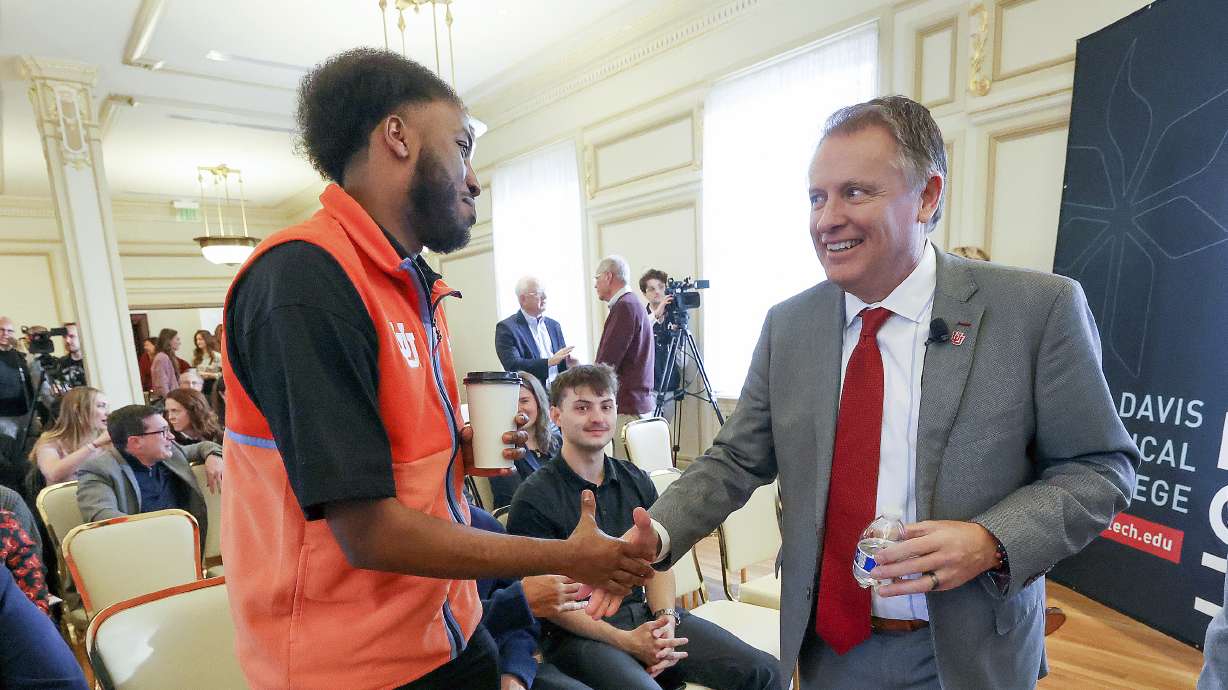Estimated read time: 5-6 minutes
This archived news story is available only for your personal, non-commercial use. Information in the story may be outdated or superseded by additional information. Reading or replaying the story in its archived form does not constitute a republication of the story.
SALT LAKE CITY — Higher education has a "remarkable, transformational power" for students, University of Utah President Taylor Randall says — and data from a new report backs him up on the benefits to individuals and society.
The University of Utah Kem C. Gardner Policy Institute on Wednesday convened a panel of four university presidents for a roundtable discussion focused on the value of higher education. Included in the group were Randall, Utah State University President Elizabeth Cantwell, Weber State University President Brad Mortensen and Davis Technical College President Darin Brush.
All four spoke to the benefits afforded through higher education. But don't take their word, alone.
A policy brief published by the Gardner Institute shows compelling data that backs these insights and contextualizes just how higher education is harnessed for both individual and societal well-being.
Individual benefits
"I think what I've always loved about higher education is it has this remarkable, transformational power in individuals," Randall said.
The policy brief said individuals with higher educational attainment enjoy greater incomes, economic stability and overall quality of life.
Data from the report shows those with a bachelor's degree enjoy median earnings $20,000 higher than those with only a high school diploma. That number jumps to nearly $50,000 for anyone with a graduate or professional degree. Logically, poverty and unemployment rates decline according to the levels of educational attainment.

Aside from the economic health of individuals, education also correlates to physical health. Utahns with more years of education report higher rates of excellent, very good, or good health and higher rates of health care coverage, according to the report.
With all of these factors considered, the reports said people with a post-graduate degree or certificate are generally happier, healthier and more confident in their future.
"Numbers are great ... but it's really the ideas and the passion (for education) underneath it that are driving all of those results that you see," Randall said.
Economic and societal benefits
The economic benefits of higher education in Utah cannot be understated. The report shows the state's public higher education system supported an estimated 130,000 jobs and $8.3 billion in labor income in 2023, making it one of the largest employers in the state.
Additionally, public higher education contributes $11.3 billion to Utah's economy. The state's R1 research universities — the U. and USU — generate 82.6% of this economic contribution.

"Along with the data that says universities are powerful economic drivers, we have the trust in every community ... by being a major employer, by not only educating and delivering workforce for the local companies, but also really, genuinely creating individuals who have ideas that startup or create new endeavors in rural areas," Cantwell said, adding it is especially crucial for rural areas of the state.
Along with serving as a pipeline to provide Utah companies with a skilled workforce, Utah's public higher education system also benefits society as a whole in forming an educated citizenry.
Data from the report shows individuals with more education have higher volunteer rates and voter participation. They're also less reliant on public assistance, with one study finding nearly ½ of graduates with bachelor's degrees, who previously used the Supplemental Nutrition Assistance Program, never participated in it again.
Questions remain
Despite all the positive individual, economic and societal impacts tied to it, people are still skeptical of higher education, in general.
A 2023 Gallup poll indicates confidence in higher education plunged from 57% in 2015 to 36% in 2023. But, why could this be and what can be done to restore public confidence in higher education?
Randall said he sees it as being attributed to three reasons. The first is the notion that higher education isn't affordable. The second is an idea that colleges and universities "create degrees to nowhere."
"I think we're really solid and against the national narrative there (in terms of cost)," Randall said, adding that the state also isn't creating "degrees to nowhere," as outlined by the Gardner Institute's findings.
Randall's third, more outside-the-box view on why folks could be losing confidence in higher education is centered around the need to inspire people and give them hope for the future.

"That's, perhaps, where we have to do more work. We don't just teach; we have to inspire," Randall said, adding that the U. is set to embark on a "self-study" to understand if all viewpoints and ideas that contribute to a "thriving American society" are present on its campus.
Cantwell said higher education institutions are "obliged" to remain trusted members of the communities they serve by engaging in real work and "being in the room" with constituents.
Mortensen chimed in with a hockey reference, saying higher education needs to be "skating to where the puck is going to be."
"Are we tapping into the potential of all of our students? Are we being innovative with how we deliver curriculum and classes? Are we staying on the leading edge of the fields that we need to be teaching for the future?" Mortensen asked. "I think it's a great opportunity and challenge to keep that in perspective. The fact that there is a lot of debate and discussion about higher education and its role both at the national and the state level right now, I think, emphasizes the importance that higher education plays. Even though there can be critical voices at times, we need to embrace that and figure out how to innovate."
The Gardner Institute's full policy brief "The Value of Higher Education," can be found here.










